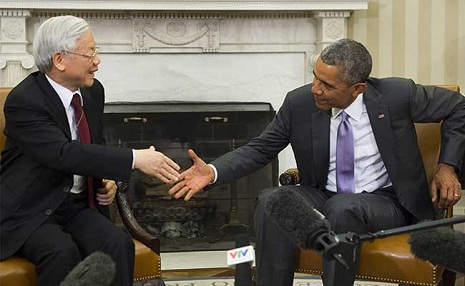Mr Trong is Vietnam`s first party general secretary to visit the US, and he met Mr Obama yesterday at the Oval Office of the While Office.
RELATED
No Peace in Sight as South Sudan Sinks Into `New Brutality`
Only 60 Syrians Being Trained to Fight Islamic State, Says US
Afghan Delegation to Meet Taliban Representatives in Islamabad
"But because, I think, of the efforts of leaders in both parties here in the United States, as well as the leadership in Vietnam over successive years, what we`ve seen is the emergence of a constructive relationship that is based on mutual respect, and that has benefitted the peoples of both countries," Mr Obama said.
In his remarks, Mr Trong acknowledged the historic significance of the meeting, and said, "I think that 20 years ago, not too many people would imagine a meeting - interesting meeting, a substantive meeting between the General Secretary of the Communist Party of Vietnam and the President of the United States."
"We had a cordial, constructive, positive and frank discussion with each other. What is of utmost importance is that we have been transformed from former enemies to become friends, partners - comprehensive partners. And I`m convinced that our relationship will continue to grow in the future," Mr Tong said.
Mr Obama said the two leaders discussed the Trans-Pacific Partnership or TPP.
They also discussed the importance of resolving maritime disputes in the South China Sea and throughout the Asia Pacific in accordance with international law, to ensure that the prosperity and freedom of navigation that has underwritten the enormous economic growth that`s taken place in the region continues for decades to come, he said.
"Both countries are concerned about recent developments in the South China Sea that have increased tensions, eroded trust, and threatened to undermine peace, security, and stability," the two leaders, in a joint statement later, said.
Mr Obama in his remarks also said, "Already in the last two years alone, we`ve made significant progress on deepening our cooperation in the areas of education, science, technology, climate change, public health, as well as security issues.
"And this was an excellent opportunity for us to deepen our discussions around our vision for a comprehensive partnership."
Mr Tong said, "At the meeting today (Tuesday), the President and I reviewed the growth of our relations over the past 20 years, and we also discussed and agreed on the major directions for moving our relationship forward to make it more substantive, more positive, to build the mutual trust and cooperation between the two countries."
"There has been a bad, difficult chapter in our history, but we have been able to rise above the past to overcome differences, to promote our shared interests, and look towards a future in order to build the comprehensive partnership that we have today.
"And as I mentioned to the President in our meeting, the past cannot be changed, but the future depends on our action, and it is our responsibility to ensure a bright future," he said.
In the joint statement, the two leaders said, looking toward the future of bilateral relations and building on the comprehensive partnership, both countries affirm their continued pursuit of a deepened, sustained, and substantive relationship on the basis of respect for the United Nations Charter, international law, and each other`s political systems, independence, sovereignty, and territorial integrity.
"The two sides are committed to maximising shared interests and cooperation at both bilateral and multilateral levels, for the benefit of both peoples, contributing to peace, stability, cooperation and prosperity in the Asia - Pacific region and the world," it said.
According to the joint statement, the US and Vietnam are committed to enhancing cooperation in regional fora, such as the Asia-Pacific Economic Cooperation forum, Association of Southeast Asian Nations (ASEAN) Regional Forum, Lower Mekong Initiative, and the East Asia Summit, and recognize the importance of a united and strong ASEAN, ASEAN`s central role in the regional political and security architecture, and the United States-ASEAN Strategic Partnership.
More about:
















































